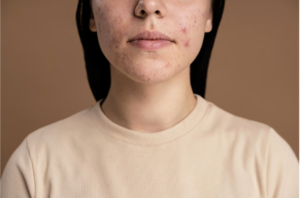Understanding Acne
Acne is a skin condition that affects millions globally. While it’s typically associated with teenagers, it can persist into adulthood, impacting self-esteem and quality of life. Acne happens when hair follicles become clogged by oil and dead skin cells, causing pimples, blackheads, whiteheads, and, in severe cases, painful cysts. When other acne medications and treatments aren’t working, it may be time to try isotretinoin.
Isotretinoin
Isotretinoin (also known as Roaccutane or Accutane), derived from vitamin A, is a powerful medication for severe, persistent acne. It works by reducing oil production, preventing pore blockages, and reducing inflammation. However, it’s crucial to use this medication under professional guidance due to the potential side effects which include dry skin, chapped lips, and mood changes. Isotretinoin can cause severe birth defects if taken during pregnancy so you may be advised to take strict contraceptive measures before, during, and after isotretinoin treatment. You may also need regular pregnancy tests to ensure your safety during treatment.
Mental Health Considerations
There are concerns around isotretinoin’s potential impact onmental health, including mood swings, and, in rare instances, severe depression and suicidal thoughts. However, the risk is relatively low and most individuals do not experience significant mental health side effects while using isotretinoin.
To prioritise your well-being:
1. Speak openly with your healthcare provider. Report any mood, behavioural, or mental changes during treatment.
2. If you notice any concerning symptoms like persistent sadness, thoughts of self-harm, or changes in mood seek immediate medical attention.
3. Use your support network. Friends, family, or mental health professionals, can support you during your treatment.
4. Strictly adhere to prescribed dosages and schedules, never alter your treatment plan without speaking to your healthcare provider.
5. Your healthcare provider will assess your unique risk factors and carefully weigh isotretinoin’s benefits against potential risks, including its impact on mental health, before prescribing it.
Accessing NHS Care for Acne
If you’re struggling with acne and seeking NHS care in the UK, follow these steps:
- Book an appointment with your GP for an acne evaluation. Your GP can recommend suitable treatments, including isotretinoin if necessary.
- Openly discuss how acne is impacting you and your preferences with your GP to create a personalised treatment plan.
Remember, acne treatment is different for everyone and look out for our upcoming post on skincare while using isotretinoin!


